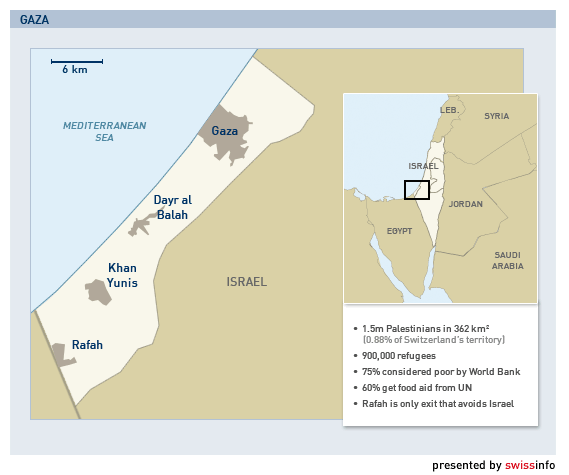
Human rights body condemns Israeli attacks

The Geneva-based United Nations Human Rights Council has adopted a resolution "strongly condemning" Israel's offensive in the Gaza Strip.
Monday’s non-binding resolution released by the Council said Israel’s attacks had “resulted in massive violations” of the human rights of Palestinians. However the resolution was not reached by consensus.
Thirty-three African, Asian, Arab and Latin American countries voted in favour of the resolution while 13 European states – including Switzerland – abstained.
The 47-member states in the UN’s human rights assembly normally take their decisions by consensus.
Before the vote, Palestinian ambassador Ibrahim Khraishi said his people were being subjected to “a barbaric act of aggression” and appealed to the Council to condemn what he called “the law of the jungle”.
But some nations said the resolution put forward by Arab and African states was too one-sided and failed to recognise the role of rocket attacks launched by Palestinian militants in triggering the offensive.
Israel’s ambassador in Geneva, Aharon Leshno-Yaar, dismissed the vote as irrelevant, saying the resolution would provide no tangible relief to the Palestinians and did not reflect realities in Gaza.
Israel, like the United States, is not a member of the council and therefore cannot vote.
International law
Swiss ambassador Dante Martinelli said that Switzerland deplored the catastrophic humanitarian situation in Gaza and called on all parties to respect their international obligations under humanitarian law and human rights.
However, Martinelli said Switzerland deeply regretted that no efforts had been made to arrive at a text that could be adopted by consensus. He said light should be shed on all violations.
Another member of the Swiss mission to the UN, Muriel Berset-Kohen, told swissinfo that Bern was uneasy about holding the special session. “But we felt the gravity of the situation made it necessary to hold,” she said.
In fact, Switzerland was the only western nation last week to support the convening of the meeting – a position criticised by the Israeli ambassador to Bern and Jewish organisations in the country.
Canada, the only nation to vote against the resolution, complained that the text, which calls for an immediate withdrawal of Israeli forces, failed to recognise that Israel had acted to stop rocket attacks on its territory from the Hamas-controlled Gaza.
Germany, speaking for European Union members on the Council, said they abstained for the same reason.
However, the resolution did call for an end to “launching of the crude rockets against Israeli civilians that resulted in the loss of 4 civilian lives” without explicitly naming Hamas. It noted that Israeli attacks had killed some 900 Palestinian and injured around 4,000.
The resolution also supports the creation of a fact-finding mission to investigate Israel’s actions, and asks UN Secretary-General Ban Ki-moon to submit a report to the General Assembly about the shelling of a UN-sponsored school last week.
Gaza health officials say the attack killed 39 Palestinians while an Israeli investigation concluded that a mortar missed its target and hit near the building. It claims Hamas inflated the casualty figures.
No safe place
Also on Monday, the Swiss-run International Committee of the Red Cross said civilians in Gaza had nowhere to run and hide.
“No place is safe in Gaza these days,” Antoine Grand, the head of the ICRC in Gaza, told the Reuters news agency. “There is no place for the civilians. They are afraid to stay home, they are afraid to move, they are afraid to go down the street or to try to buy some food.”
Unlike other conflict zones, civilians in Gaza have nowhere to escape to because the territory is ringed on all sides by Israeli land and sea forces.
Grand said the ICRC had been fired on twice in recent days as its convoys tried to carry out humanitarian work.
Israel launched its offensive against Hamas 17 days ago.
swissinfo with agencies
Hamas emerged in 1987 at the beginning of the first intifada.
The name is the abbreviation for Islamic Resistance Movement, but it is also the Arabic word for “enthusiasm”.
Although its charter calls for the destruction of Israel, leaders have said they are prepared for a long-term truce if Israel withdraws from land captured in the 1967 war.
Most western states regard it as a terrorist organisation and refuse to deal with it.
Hamas won democratic elections in the Palestinian Territories in 2006.
It took power in Gaza in June 2007 after months of fighting with the rival Fatah movement of President Mahmud Abbas, which still runs the Palestinian-ruled parts of the West Bank.
Since then Israel has imposed a tight blockade on the Strip, allowing in only bare essentials.
Hamas has fired missiles at the Israeli town of Sderot; Israel says the current invasion is designed to protect its citizens there. At the end of last December, there had been 19 Israeli civilian deaths following rocket attacks since 2002.


In compliance with the JTI standards
More: SWI swissinfo.ch certified by the Journalism Trust Initiative




























You can find an overview of ongoing debates with our journalists here . Please join us!
If you want to start a conversation about a topic raised in this article or want to report factual errors, email us at english@swissinfo.ch.